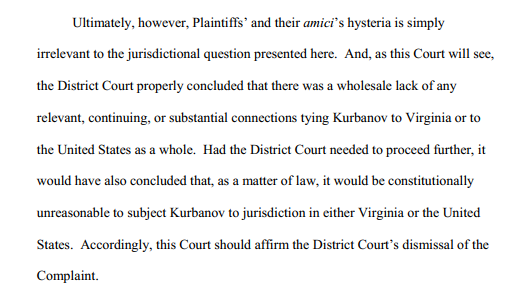
Last year, a group of prominent record labels filed a piracy lawsuit against the Russian operator of YouTube-ripping sites FLVTO.biz and 2conv.com.
The labels hoped to shut the sites down, but this effort backfired.
In January, US District Court Judge Claude M. Hilton dismissed the case due to a lack of jurisdiction. The Virginia Court carefully reviewed how the sites operate and found no evidence that they purposefully targeted either Virginia or the United States.
The sites are not seen as highly interactive and their interaction with users could not be classified as commercial, the Court concluded. Since the site owner didn’t purposefully target Virginia, the Court ruled that it doesn’t have jurisdiction over the operator.
The record labels didn’t agree with this conclusion and took the case to the Fourth Circuit appeals court. If the verdict stands, the companies believe that Internet pirates will have “carte blanche” to facilitate copyright infringement, as they would be untouchable by U.S. courts.
The labels’ appeal attracted support from other major copyright holders. Through amicus briefs, Hollywood’s MPAA, The Association of American Publishers, and the Copyright Alliance, all argued that the verdict should be overturned.
This week, the Russian operator, Tofig Kurbanov, submitted his answering brief. Through his legal team, he informs the Court that the District Court was right to dismiss the case. He has never been to the U.S. and managed the sites entirely and exclusively from Russia.
Aside from going into detail on all the legal elements of the jurisdiction issue, the response also hits back at the massive piracy claims and “xenophobia-tinged” allegations from the record labels and other rightsholders.
“Cognizant perhaps of the complete absence of a Constitutional basis for the
assertion of personal jurisdiction over Kurbanov, Plaintiffs and their amici seek to make up for this omission with a combination of xenophobia-tinged allegations and ‘the sky is falling’ arguments,” the response reads.
The scope of the alleged infringing activity should not mean that the Court can ignore Constitutional limitations, the defense argues. According to the site operator, it should also be noted that the same rightsholders have a history of targeting new technology.
“Plaintiffs and their amici have consistently opposed virtually every technological advance from the 1970s forward including the advent of cassette tapes, compact discs, digital audio tapes, and MP3s.
“In each instance, Plaintiffs and their amici’s cries that the sky was falling
were either misplaced or entirely made-up,” the defense adds.
The Russian site operator continues that the rightsholders’ “hysteria” is ultimately irrelevant. The appeal is about whether or not the Court has jurisdiction over the matter. According to the defense, it’s clear that it hasn’t.
Hysteria

The record labels placed a lot of emphasis on the site’s advertisements in their appeal brief. For example, they argued that the stream-ripping sites used geolocation-based advertisements to target specific locations, including the United States and Virginia.
The defense counters this by stressing that all of the advertising activities were outsourced to third party companies, which make it irrelevant.
“Plaintiffs’ attempts to tie personal jurisdiction to the geolocation of ads on
the Websites is misplaced, where any such geolocation is accomplished solely by third-party advertising brokers,” the defense writes.
The labels also argued that because the sites are generating revenue from US visitors, there is a “commercial” relationship so the Court has jurisdiction. This ‘free’ advertising model is widely used by other companies such as Facebook, ESPN, CNN, they argued.
In its response, the defense doesn’t dispute that these other sites use advertising. However, it uses that argument to its advantage while noting that Facebook, ESPN, CNN are not automatically subject to any and all jurisdictions in the world.
While it is true that the stream-ripping sites are available in the US, that’s certainly not their most popular user base. For FLVTO.biz, more than 90% of the visitors come from other countries, and for 2conv.com this number is more than 94%, the defense informs the Appeals Court.
It is worth noting that the current issue is not about whether or not the stream-rippers are copyright-infringing in any way. The question that has to be answered first is whether a U.S. court has jurisdiction over the Russian operator of the sites.
Many of the arguments that both sides presented are similar to those put before the District Court earlier. The record labels and other rightsholders hope that the earlier dismissal will be overturned, while Kurbanov and other site owners prefer to keep it in place.
–
A copy of the full answering brief of defendant-appellee Tofig Kurbanov is available here (pdf).





